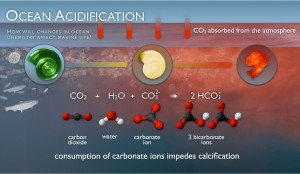
Washington, D.C. – Representatives Don Young, Sam Farr (D-CA), and Lois Capps (D-CA) Friday introduced H.R. 2717, the Federal Ocean Acidification Research and Monitoring (FOARAM) Act of 2015, to expand NOAA’s efforts to study the impacts of ocean acidification, which could threaten an estimated $350 billion blue economy that employees over 2.9 million people in the United States.
The bill addresses the need for a greater understanding of the economic, social and ecological impacts of ocean acidification. It will expand the current NOAA program by creating an advisory board to increase communication and coordination between the public and private sectors.
“The FOARAM Act has provided crucial funding for NOAA’s ocean acidification research efforts, including those housed at the University of Alaska Fairbanks,” said Congressman Don Young. “This research has increased our understanding of where changes are occurring, how they vary by region and the ways they impact marine life, particularly shellfish. Alaska’s shellfish industry has significantly benefited from this important NOAA research, which has allowed the industry to mitigate and adapt to our changing oceans.”
Rising ocean acidity has the ability to impact marine organisms that are the basis for our blue economy. Under increasingly acidic conditions, marine organisms with a hard shell are particularly impacted – threatening many lucrative fisheries such as crabs, lobsters, oysters, clams and mussels.
“The strength of our economy is directly tied to the health of our oceans,” said Rep. Farr. “Ocean acidification is not just a coastal problem; it threatens our entire national economy. We need to develop solutions to the problem of ocean acidification right now to protect our greatest natural resource and the industries it supports.”
Ocean acidification can also threaten coral reefs, which provide shoreline protection and habitat for many species of fish. The estimated impact on coastal communities – from decreased tourism revenue to declining fish populations – is over $1 trillion due to coral reef loss.
“Ocean acidification threatens not only the health of our oceans and the marine organisms in them, but our local economies and industries that depend on the oceans for their livelihoods,” Rep. Capps said. “Rising ocean acidity is already having a tremendous impact on our oceans, which is why we cannot wait any longer to address it. I am proud to have co-authored this bipartisan update to FOARAM with my colleagues Rep. Farr and Rep. Young to help our nation better understand and mitigate the impacts of ocean acidification as well as support our coastal economies.”
Created in 2009, NOAA’s Ocean Acidification program laid the groundwork for researching into ocean acidification. This re-authorization will provide a needed update to the program to allow our nation to respond quickly to new research and move toward identifying solutions to mitigate the effects of ocean acidification.
